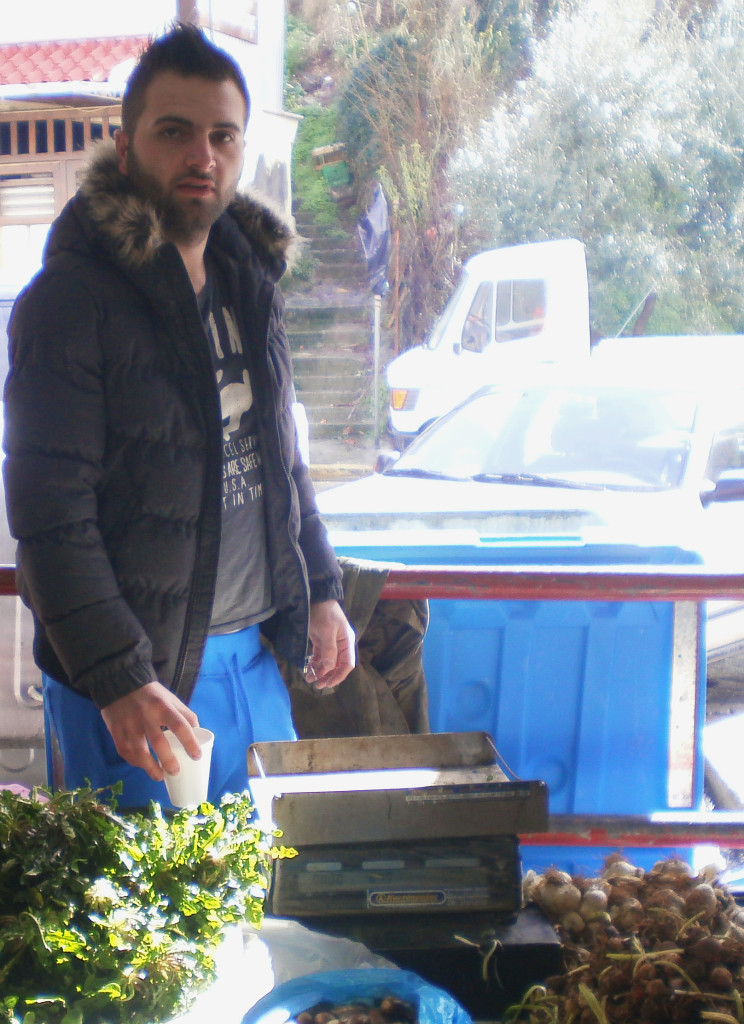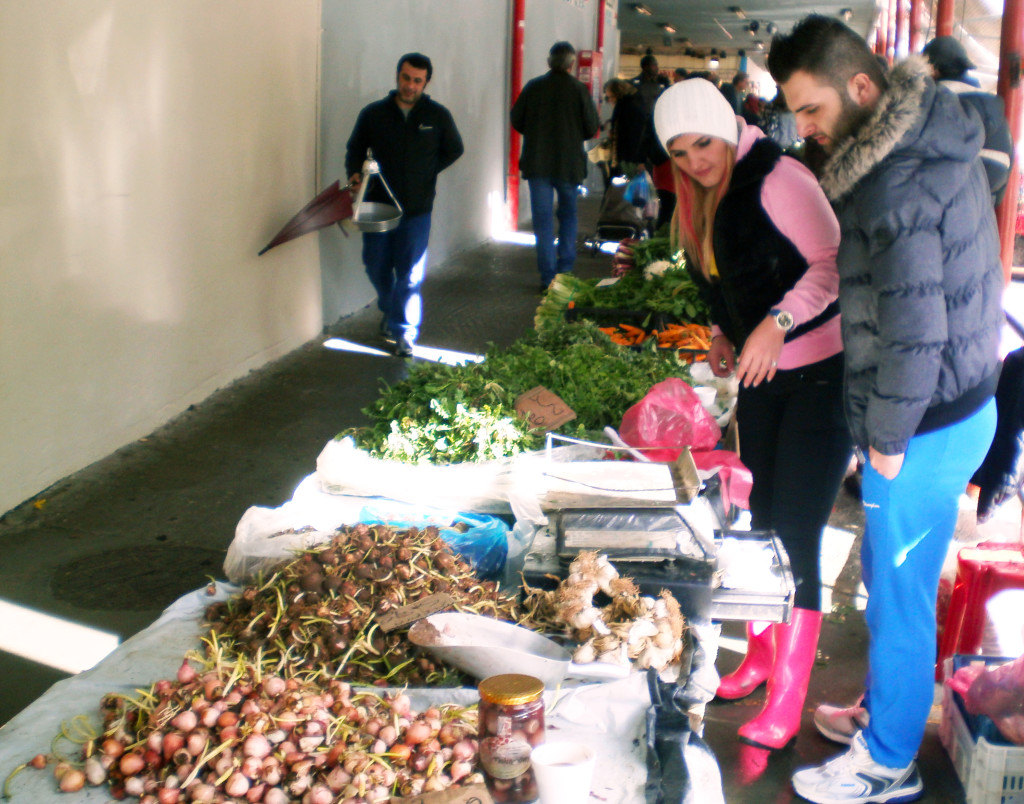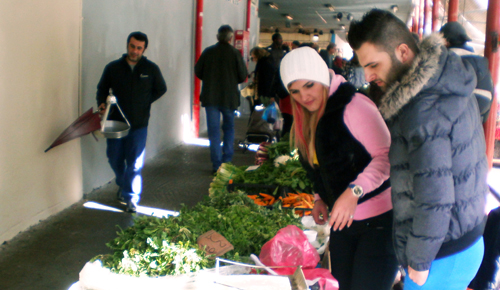
In the last several years, stories have abounded in the American press about the struggles of recent college graduates. Unable to find jobs, overeducated young workers end up waiting tables, brewing espressos, and living with their parents. In Europe, the joblessness of the young — long an issue throughout the continent — has become desperate: Spain, for example, now has a youth unemployment rate of 56 percent, 17 percentage points higher than its rate four years ago, with no relief in sight.
And yet Greece — the country worst hit by the recession in Europe — offers a new twist on this woeful tale of well-educated but luckless youth. With no good job prospects, some college grads there are turning to one of the world’s oldest professions: farming.
Foteini Kollias is one of them. Now twenty-five-years old, she graduated with a degree in physical education from the National University of Athens around the time Greece’s economy collapsed five years ago. Unable to get a full-time job in her field, she eventually turned to growing fruit in Nafplio, a seaport town to the southwest of Athens.
Once a week, Kollias makes the hour-and-a-half trip to Athens to sell her fruit in the city’s central market. Over four years of farming, the hard labor has taken a toll on Kollias’s health, leaving her with a meniscus tear in her right knee that gives her constant pain. “Imagine lifting a box loaded with forty-five kilos of cucumbers every day while weighing no more than fifty kilos [110 pounds] yourself,” she says.
It is a grim outcome for a young woman who had been on track to get a well-paid government job before the economic crisis hit. “Torturing my body for so little money and no future prospects really depresses me,” she says.
Of course, youth unemployment is not just a problem for people in rich countries. The global recession has damaged the prospects of young workers throughout the world, and even as economies have recovered, the jobs have not come back. The problem is much worse for those without college educations.
Yet facts like these provide little consolation to young, educated workers like Kollias, whose careers have been permanently scarred by the country’s deep recession, which began in 2008 and has yet to end. Last year, the economy shrank by 6.4 percent. The nation’s unemployment rate currently stands at 27.6 percent, more than twice the average rate in the Eurozone and more than three times what it was when the crisis struck in October 2008. Other countries in Europe have also been beset by severe economic problems in recent years, but Greece has been hit the hardest, becoming the focus of international efforts to stop the spread of its economic ailments throughout the continent’s interconnected market.
There are many reasons given for the collapse of Greece’s economy and the massive unemployment it unleashed. One school of thought argues that huge budget deficits and expensive government benefits — in Greece, excessively generous worker pay and pensions — were at the heart of a crisis accelerated by the global recession. Other economists point to evidence that the economic collapse had more to do with the destabilizing rush of foreign dollars into those rapidly growing economies. Regardless of why it happened, the damage is clear: In 2004, Greece’s national debt was 99 percent of its GDP. Last year, it was 157 percent.
In Greece itself, much attention has been focused on political mismanagement. According to one popular account, one-party governments led alternately by the center-right New Democracy party and the center-left PASOK spread a pandemic of corruption and incompetence within a nepotism-plagued public sector, which had been growing unsustainably up until the crisis. Wall Street firms such as Goldman Sachs helped the government to fudge statistics and conceal its rising debt levels from European regulators. Meanwhile, the allure of fast money had eroded ethical standards in the country to the point that tax evasion became rampant.
Amid the country’s recent decline, it is difficult to remember the Greece of the fifties, sixties, and seventies — a period called the “Greek economic miracle” — when the country’s economy was roaring. Occupied during World War II and devastated by the civil war that followed, Greece began its rebuilding in the fifties with an ambitious campaign to “urbanize” its rural communities. En masse, Greeks living in the countryside moved to the expanding concrete landscape of the cities, rapidly expanding the workforces and consumer markets to be found there. The Greek “miracle” ended in the seventies, but healthy economic growth continued over the next few decades — until 2008.

Now the same process seems to be happening in the other direction, as young urbanites dash back to the fields. According to a survey conducted for the country’s Ministry of Rural Development in the populous counties of Attica and Thessaloniki, 68 percent of respondents — representing over one million Greeks, in a country of just ten million — are considering leaving the city. Two-thirds of them are college graduates, and a majority of them under the age of forty. Nineteen percent of those surveyed said they have already initiated their moves.
The Greek press likes to call the country’s legions of unemployed young workers its “Lost Generation” — a term also used in the US and UK, among other countries, to identify their own struggling youth. It may be hard to compare their experience to that of the iconic Lost Generation of young men and women traumatized by the bloodbath of World War I. That said, these young Greeks have been traumatized by a cataclysm of an economic kind: a massive contraction of the nation’s economy on the order of 20 percent over five years. Their job prospects remain bleak even as the global economy has recovered: youth unemployment — for workers aged twenty-four and under — now stands at 64.9 percent, triple the rate five years ago. (Among those aged twenty-five to thirty-four, the rate is 38 percent, but for those thirty-five to forty-four, it is much smaller — 25 percent — proving that unemployment is wasted on the young.)
Greece, once one of Europe’s rising stars, now looks to be headed in the same direction as Japan during its “Lost Decade” of the nineties — into an age of diminished expectations, with swelling ranks of unemployed youth, and no simple way out of its economic malaise.
In the elegant coastal city of Kalamata, sister and brother Demetra and Vassilis Psonis tend to a stall in the farmers’ market, where their many wares are on display: chestnuts, peaches, tangerines, cherries, onions, cabbages, corn, and a variety of greens. When the recession struck five years ago, Demetra was just beginning her studies at the Technological Institute of Crete, where she majored in accounting. Up until the country’s crisis, Demetra had been confident that she would land a job in a field that — back then — was highly paid and secure. “Trying to find decent employment in the recession turned out to be a wild goose chase,” says Demetra, twenty-three. “I soon ended up working in a cafeteria.”
At the time, Demetra considered moving to a wealthier country in northern Europe to seek out better employment opportunities. But she had no idea about what city to move to, much less how to transplant herself there — even within the borderless European Union, labor is not as mobile as capital. “Going abroad? Where and with whom?” she asks. “I didn’t have to dwell a lot on the decision.” So Demetra ended up returning to her family’s farm in Kalamata. She knew the work well; she had been growing vegetables there ever since she was ten years old.
Her brother soon joined her. Vassilis, twenty-five, had trained to be a hairdresser. But when he graduated from school, he couldn’t find a job, and he lacked the capital to open his own business. Even if he did have a salon, he says, it was obvious then that few people would be paying good money for haircuts in that economic climate.
Like his sister, Vassilis worked the fields of his family’s farm as a child. “I always felt I had an alternative in case things didn’t go as planned,” he says. “I like it. I like everything that involves my hands. I tell myself I hold the hoe instead of the brush.”
Oddly enough, when the siblings decided to return to Kalamata, the people most opposed were their parents. Farmers for life, they and their generation had suffered through the misery of hard manual labor. They had cheered Greek’s meteoric ascent to economic power. They had dreamed of raising future academics, lawyers, and scientists who would lodge their families — and the children and grandchildren to come — within the well-paid professional classes.
“They sacrificed their lives to offer us a good education,” Vassilis says. But when the economy fell apart, those newly minted educations became worthless. And Vassilis, Demetra, and many of their peers headed for the fields — the familiar trend of urbanization played in reverse.

The ancient Greek playwrights, who developed the concept of irony, would find much to write about concerning modern Greece’s travails. Older generations of farmers who once exhorted their children to seek out more and more education now find themselves advising the same kids — off the record — to take up farming again to “fill their stomachs.”
And yet Tassos Papaphilis, a thirty-four-year-old farmer, is reluctant to advise anyone, however desperate, to follow his path. Tassos grows crops in Corinth, an hour’s drive west of Athens. He is somewhat of a celebrity in the Athenian market where he sells his fruit, a long-haired jokester who teases and compliments passersby as he implores them — sometimes aggressively — to smell the sweet fragrance of his oranges.
A trade-school graduate, Tassos used to work as an estate agent for a large Corinthian firm, but he lost his job five years ago when the recession annihilated the country’s real-estate markets overnight. Unwilling to leave his birthplace, he decided to take up his father’s profession of farming. These days, he grows oranges, tangerines, and zucchini, and rears hens to sell their eggs.
His father died around the same time that Tassos lost his job. Farming became a way of coping — more than just financially. When plowing the soil, Tassos says, he feels an intimate connection to his dead father.
But his decision to go into farming has not yet paid off with a stable income, in spite of how hard Tassos works his fields. Taking over the family farm was “the biggest self-entrapment of my life,” he insists. Early on, Tassos received a European Union farm loan of 35,000 euros to enhance his business. But the country’s consumers cut back on their spending much more than expected, and with the markets so sluggish, his plans to expand his farming business came to naught. He has yet to repay the loan, and with his payments on it now exceeding his profits, he is doubtful that his crops will ever bring in enough money to do so.
In fact, Tassos is still dependent on his grandmother’s pension to make ends meet. In this regard, he is like a growing number of young Greeks, who, unable to keep up with their monthly rent and bills, have retreated to the family nest, living off the incomes of more secure parents and grandparents.
Now well into his thirties, Tassos knows he cannot start a family when he can barely feed himself. And there is no telling if and when the troika of European and international lenders who now prop up Greece’s economy with loans will decide to pull back, leaving Greece to implode. “The worst is yet to come,” Tassos warns.
Even though his farm is doing poorly, even though he has lost his business career, Tassos the farmer keeps greeting his customers in the market with a smile and a joke. “People are grumpy and sober nowadays,” he says. “Making others laugh is an antidote to depression that comes free of charge.”
The economist John Kenneth Galbraith once observed that unemployment in the days before industrialization was unheard of: “In traditional agriculture it did not exist; there was always work to do on the farms and in the supporting rural services.” During the Depression, he added, “farm employment or farm existence of a sort was the resort of some millions of urban workers in the United States.”
The Great Depression may offer this and other practical lessons for those struggling through the Great Recession. And yet it is also true that farming has become a less reliable last resort for families, with less bread to go around to their many breadwinners.
The rise of huge corporations has transformed the practice of agriculture and drastically lowered prices — and profits. It has become abundantly clear to Kollias, the farmer from Nafplio, how much things have changed. Her parents are both well educated: her mother studied medicine and her father is a mechanical engineer. In their thirties, they chose to become farmers because they valued their freedom, Kollias says. A family farm, back then, could actually support a family. “They worked hard, but their profit was in proportion to their labor hours,” she says. “If you had been eager to devote your body and soul to the land, you could have made good money in the past.”
Not anymore. Kollias puts it bluntly: “My brother, father, mother, and four workers live in the same house and struggle to scrape together a living,” There are no more “happy farmers,” she says — nothing like the yeomen farmers of Romantic poetry and Thomas Jefferson’s writings, tilling the soil and communing with nature — just jaded, overeducated young workers like her, anxious about their unsold merchandise and demoralized about their futures.
In between her trips to the farmers’ market in Athens, Kollias works occasionally as a lifeguard and gym instructor. The jobs pay little, but they help her retain the skills she learned studying physical education in college. When she was a student, she planned to take the civil-service exams and get a government job in her field. But when the crisis hit, the exams were called off. They have yet to be unfrozen. With no one willing to hire her, Kollias continues to grow her fruit.
With the years they spent in college amounting to nothing, and their work in the fields offering diminishing returns, the talents of Greece’s younger generation are being squandered. Who is to blame for the country’s modern tragedy? Kollias is unsure. She believes everybody shares some of the fault, even if she singles out Greece’s politicians for special scorn. “Still,” she adds, “we eat what we sow.”
Stav Dimitrοpoulos would like to thank Eleftheria for the newspaper’s help in finding interviewees and photographs for this story.
Stav Dimitrοpoulos Stav Dimitropoulos is a writer and journalist whose work has appeared in major US, UK, Australian, and Canadian outlets. A native of Greece, she received the Athens Medal of Honor at the age of seventeen and went on to receive a master's degree. She experimented with journalism along the way, and has been writing ever since. Facebook | Twitter: @TheyCallMeStav
- Follow us on Twitter: @inthefray
- Comment on stories or like us on Facebook
- Subscribe to our free email newsletter
- Send us your writing, photography, or artwork
- Republish our Creative Commons-licensed content

